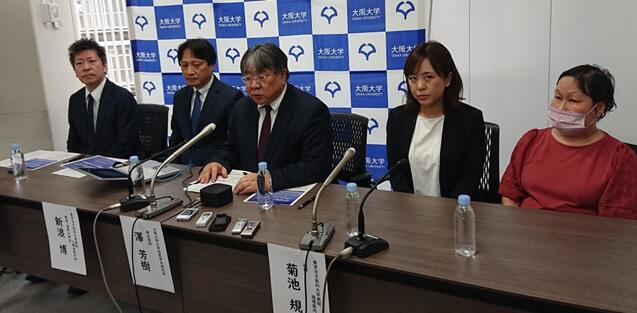Approximately ten years have passed since Professor Shinya Yamanaka received the Nobel Prize for the discovery of iPS cells, and the practical application of iPS cell-based regenerative medicine seems to be on the horizon. A research team led by Professor Yoshiki Sawa of the Graduate School of Medicine at Osaka University announced that they have completed the transplantation of iPS cell-derived cardiomyocyte sheets in eight patients in their investigator-initiated clinical trial. The symptoms of all eight patients have improved. One of the patients who received the transplant in March and recovered uneventfully said, "I feel very well after the surgery."
Between six months to a year after the observation period, the research team will submit an application to the Pharmaceuticals and Medical Devices Agency (PMDA) to obtain conditional time-limited approval for the cardiomyocyte sheets. Sawa commented, "Thanks to all staff, co-researchers, and clinicians, we have been able to come this far. I deeply appreciate the patients who participated in the trial."

Sawa and his colleagues started research on cardiomyocyte regenerative treatment using cardiomyocyte sheets in 2000 and initiated collaborative research with Professor Yamanaka in 2008. When Yamanaka received the Nobel Prize, the Japanese government decided to invest 100 billion Japanese Yen over 10 years to facilitate the clinical application of the regenerative medicine. Ever since 2013, when the research by Sawa and his colleagues was selected as a project named "Centers for Clinical Application Research on Specific Disease/Organ (Type A)" in the Research Center Network for Realization of Regenerative Medicine, the group has been engaging in the research and development of a treatment for severe cardiomyopathy using human iPS cells. In 2015, the team obtained a clinical iPS cell line from Kyoto University and began consulting with the PMDA on production methods and nonclinical safety studies.
There were various challenges to the clinical application of iPS cell-derived cardiomyocyte sheets. First, the maximization of mass proliferation and efficient induction of differentiation had to be achieved, because as many as 100 million cells are needed to produce cardiomyocyte sheets for transplantation in one patient. Additionally, the problem of undifferentiated iPS cells had to be resolved completely to avoid cancerization risk.
Second, immunosuppressant medication was necessary, because the iPS cell-derived cardiomyocytes would be attacked by the immune system. Achieving the most effective application approach with the least side effects involved establishing techniques such as cryopreservation, thawing, and the method for iPS cell-derived cardiomyocyte sheet formation, as well as a means to facilitate stable transportation of the sheets to the places where implantation will be performed.
Through a range of R&D, the research team achieved mass proliferation maximization and efficient differentiation induction by increasing the reactor size from 100 mL to 500 mL. Additionally, they succeeded in managing clinical iPS cells at the genomic level and formulating an immunosuppression protocol by tapping into their experience of cardiomyocyte transplantation. Furthermore, the team produced transplantable iPS cell-derived cardiomyocyte sheets that can endure up to 72 hours of transportation, allowing exploitation of the sheets throughout the world.
The investigator-initiated clinical trial was performed on patients with ischemic cardiomyopathy, who met inclusion criteria such as a left ventricular ejection fraction (LVEF; fraction of chamber volume ejected in systole [stroke volume] in relation to the end-diastolic volume) of equal to or less than 35%.
The first half of the trial, conducted at Osaka University Hospital between January and November 2020, was performed on three patients to assess the safety of the cardiomyocyte sheets. After safety was confirmed, cardiomyocyte sheets were transplanted into two patients at the Juntendo University Hospital in 2022, one patient at the Kyushu University Hospital and another at the Osaka University Hospital in January 2023, and one patient at the Tokyo Women's Medical University in March 2023.
According to Professor Hiroshi Niinami of Tokyo Women's Medical University, "The surgery was performed by placing and fixing three cardiomyocyte sheets on the heart lesion through a lateral abdominal incision. The surgical burden on the patient was small because the invasiveness of the surgery was minimal compared with regular surgery, and the operation time was 77 minutes."
Sawa further explained that all the patients are able to perform normal daily activities. Detailed analysis of the treatment efficacy will be performed using postoperative data at 6 months.
The ischemic cardiomyopathy targeted in this trial is characterized by patchy ischemic regions that form in a part of the heart owing to heart failure or other conditions. If untreated, heart function will deteriorate over time and may reach a condition requiring an artificial heart or heart implantation. The efficacy of medication or catheter treatment is limited. If conditional time-limited approval for the iPS cell-derived cardiomyocyte sheets can be obtained, it will be encouraging news to patients with ischemic cardiomyopathy (whose numbers are expected to be in a few tens of thousands). Moreover, Sawa and his colleagues are pursuing practical application of the cardiomyocyte sheets in the USA as well. He added, "In the future, we hope to establish a cardiomyocyte sheet export industry."
This article has been translated by JST with permission from The Science News Ltd. (https://sci-news.co.jp/). Unauthorized reproduction of the article and photographs is prohibited.




